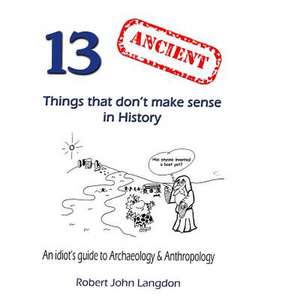13 Ancient Things That Don't Make Sense in History
en Limba Engleză Paperback
Preț: 217.75 lei
Nou
Puncte Express: 327
Preț estimativ în valută:
41.67€ • 43.50$ • 34.48£
41.67€ • 43.50$ • 34.48£
Indisponibil temporar
Doresc să fiu notificat când acest titlu va fi disponibil:
Se trimite...
Preluare comenzi: 021 569.72.76
Specificații
ISBN-13: 9781907979088
ISBN-10: 1907979085
Pagini: 170
Dimensiuni: 216 x 216 x 11 mm
Greutate: 0.32 kg
Editura: ABC Publishing Group
ISBN-10: 1907979085
Pagini: 170
Dimensiuni: 216 x 216 x 11 mm
Greutate: 0.32 kg
Editura: ABC Publishing Group
